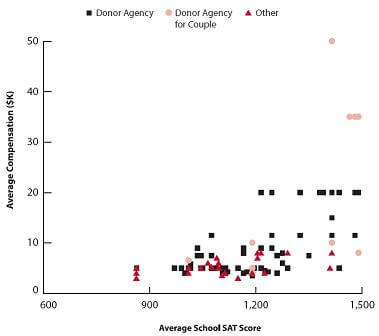
Want another reason to get into a prestigious university? A study recently published by the Hastings Center shows couples are willing to pay more for eggs from donors who attend top ranked colleges. All things being the same, when a university has a higher average SAT score, its students are offered more for their eggs. For every increase of 100 points on the SAT, the rate of compensation increased by $2350. Aaron D. Levine of Georgia Tech, study author, examined 105 ads for egg donors published in the newspapers of 63 colleges and saw that nearly half of these requests exceeded the recommended levels of compensation. We may be years from the birth of designer babies, but these trends show that couples with the means are already willing to pay more in the hopes of getting a child with smarter genes.
The world is still trying to determine how to consider and regulate the donation of parts of your body. Private organ sales, and organ trafficking, are hotly contested, and nations are trying to tightly control such trade. Blood samples, on the other hand, are taken, stored, and exchanged like baseball cards. For now that difference fits because you can do much more with an organ than with blood. Soon however, genetics will put almost all body donations on nearly equal footing. We are approaching a time when the potency of science will make every cell a precious commodity. Reproductive medicine is one of the few fields where individual cells (eggs) are already treated in that way. Looking at that field gives us an idea about how governments, agencies, and individuals will seek to control their genetic material.
In the US, the egg donor industry is almost completely self regulated. Two agencies, the American Society for Reproductive Medicine and the Society for Assisted Reproductive Technology, have guidelines that members are encouraged to follow. There is effectively little to no enforcement however. Polls by the SART showed that average compensation was around $4200 in the US. The average compensation for a donor according to the ASRM should be less than $5000, with an absolute maximum of $10k.
In fact, Levine found that nearly half of all advertisements offered more than $5000, and about a quarter were above $10,000. Ads for $20k or $35k were fairly common and Levine found one case of a $50,000 compensation package offered at Brown University.

Peruse through enough college newspapers, and you’re likely to see advertisements for egg donors that far exceed these amounts. Levine alludes to ads for as much as $100k. I can remember that in my freshman year in college (more than a decade ago), my friends and I marveled at ads that regularly offered more than $60,000 for the “right type” of donor. Good grades, good health, good eye sight – these were standard, but many ads also specified ethnicity, eye color, and even sexual preference. All such requests contradict the guidelines set by the ASRM and the SART.
Levine also found that the compensation offered in ads varied greatly depending on who did the advertising. Individual couples, or couples working with a donor agency offered an average of $3300 more than fertility clinics. That’s a huge difference when compared to the average price of $4200. It speaks to how parents are seeking control over the genetic characteristics of their perspective young.
At some point soon, that control is going to increase to levels we’ve never seen before. Genetic manipulation of embryos is generally illegal all over the world. However, it isn’t much of a leap to think that if some parents are willing to pay $100k for a better egg donor, others will be willing to pay as much for a better egg. Improvements in prenatal genetic testing may allow parents to be more selective about their young. Again, when parents are willing to pay more for better results you can rest assured that they’ll pay more for tests that make embryo selection a guaranteed path to better babies.
Levine’s study was a call for a greater understanding of the ethics of egg donation. I think that’s in good form. We need to understand the trends in reproductive health now before we’re faced with larger issues. I don’t favor heavy regulation for our body parts, and I think designer babies are inevitable. Others will feel differently. As long as we’re all well informed about the scientific facts, we should be able to develop the ethics we need to move forward.
[image credits: Levine, Hastings Center 2010]
[source: Levine, Hastings Center 2010, ASRM, SART]


